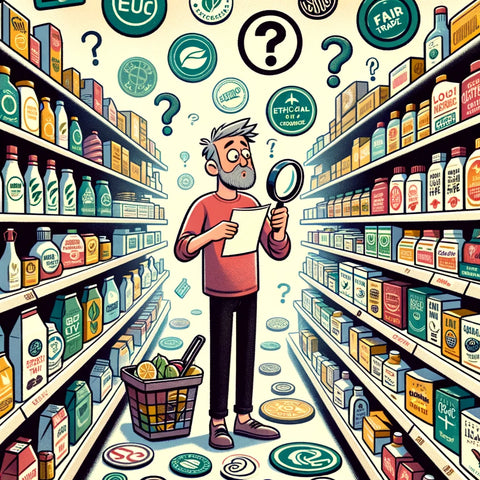Navigating Ethical Consumerism in Grocery Shopping
Ethical Consumerism - navigating the complexities of making consumer choices.
consumer choices.
I now wholeheartedly support the concept of ethical consumerism, which boils down to going food shopping guided by your moral compass rather than a list. The ingredient labels could make you reach for your reading glasses as you peruse the aisles of the grocery store, and you might even begin to question the ethics of a chocolate bar. Listen as I share the ups and downs, and the hilarious in-betweens, of being a conscientious shopper in a society that doesn't always aid me.
Buying coffee that doesn't contribute to deforestation seemed like a simple way to start being a more ethical consumer. Just how easy is that? That is where I initially encountered the complexities of moral decision-making. Along this detour, I learned new words like "shade-grown," "fair trade," and "bird-friendly." Even as an adult, I still find myself perusing coffee aisle labels, attempting to decipher the significance of various certifications. Since I appeared bewildered, someone approached me to see if I needed assistance. "Yes," I said, "I’m trying to save the world one coffee bean at a time." It was the first of many instances when we discovered we had things in common and became friends, but we just shrugged it off.
The ethical considerations of common consumer goods have recently been somewhat of a fascination of mine, after what feels like an unending amount of study. Shops say a lot about our personalities, from the clothes we wear to the cleaning products we buy. However, that doesn't imply it has to be depressing. I still can't believe how far I've gone to make sure the socks were made in an ethical manner or that the toothbrush is eco-friendly. In a dream, I was pursued by enormous, morally gray bananas as strangers and store owners fought fiercely.
The discovery of shoes made in an ethical manner was an unforgettable experience. My main criteria were the item's durability, visual appeal, and impact on the environment and the people who created it. While on my quest, I consulted the internet, that great oracle, perused every store in the vicinity, and considered learning how to cobble. For me, finding a pair that met all my requirements was just as satisfying as constructing them from scratch. Putting them on made me feel good since I was putting my words into action.
However, there are several obstacles to overcome. Exploring the realm of ethical consumption will lead one into a labyrinth of inconsistencies and roadblocks. Finding a happy medium between concern for others, consideration for the environment, and financial limitations is not easy. My favorite "ethical" brand turned out to be immoral, and it was frustrating to find out that certain options are luxury items that other people just cannot buy.
Whatever the case may be, I can honestly state that making ethical purchases has made my life much richer. I am better able to think analytically, empathize, and even laugh at myself now because of it. The fact that we may all sincerely try ought to serve as a stark reminder of how critical it is. The impact of even the smallest decisions may be immense; my shopping cart is only a little part of that bigger picture.
In all honesty, I'm not writing this to make others feel bad about themselves or fulfill some kind of obligation; rather, I want to share my story in the hopes that it may encourage people to think about how their purchasing habits affect the environment and the people in it. Why even try to make a difference in the world if it doesn't bring us joy?






Leave a comment